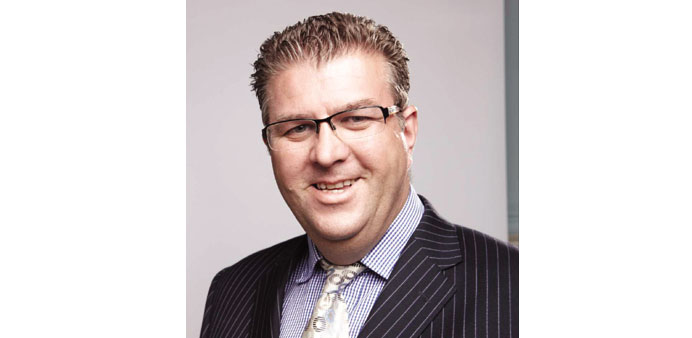Sean Tompkins: RICS chief executive officer.
The Royal Institution of Chartered Surveyors (RICS) will open an office in Qatar next year.
Dr Sean Tompkins, RICS chief executive officer, in an interview with Gulf Times, explained: “We are looking at opening up in Qatar during the next financial year, in 2015. We are interested in Qatar because we can see the demand for significant infrastructure and development, and we are currently working through our Dubai-based director looking at the demand and what is needed in the market. We have made a decision to offer our qualifications within Qatar.”
The international professional body with more than 100,000 members provides education and training standards, protects consumers with strict codes of practice and advises governments and business. RICS promotes and enforces the highest professional qualifications and standards in the development and management of land, real estate, construction and infrastructure.
The chartered surveyors accredited by RICS are recognised by the designation after their name: MRICS (Member), FRICS (Fellow) and AssocRics (Associate).
Tompkins said there are several routes to attaining the level of expertise needed for accreditation.
“Training depends on experience. If you are starting from scratch and you haven’t even done a relevant degree you might be looking at more than five years. However, if you are experienced professionally in the market place, and have done some form of degree within the built environment, then you might be looking at anything from a year to two years. It just depends where the person is in their experience and qualifications.
“The usual path would be to do a three-year degree, either by physically going to university or through modular distance learning. There are plenty of providers who provide modular programmes and there are many people around the world who use distance learning. Once someone has achieved their academic threshold, then they go through a two-year structured training program in the workplace where they are developed to achieve certain professional competencies. These are assessed after a minimum of a two year period.”
He noted: “Often we find that people have done some form of degree, maybe linked to project management or urban development that is relevant and would give them an advantage in achieving our qualification.”
It’s a qualification that opens up world-wide opportunities, Tompkins pointed out: “Because it’s a qualification that has global recognition – wherever someone achieves it they are not limited by the nature of their qualification as to where they can work in the world,” he said.
There is a growing need for such professionals internationally.
“To give you some idea of the demand – we have more than 60,000 people who are in the process of qualifying. We qualify people in many parts of the world. We have operations in 27 countries,” he said.
He cited recent research done in India that gives a striking indication of the demand for highly-trained professionals in this field. “India did some work on looking at the growth of the population and the urban expansion of the population and they concluded that they will need over the next 10 years to develop within India at least 50,000 chartered surveyors. Given the scale and magnitude of what they need to do – in layman’s terms it amounts to building a city the size of Chicago every year for the next 25 years just to cope with their population and urbanisation,” he said.
Increased urbanisation, driven by population growth, is a global trend.
“If you look at the population statistics, we’re on track for about 9bn people living on our planet. For the first time in history, in 2010 more people around the world lived in towns than they did in rural communities. By 2050 the forecast is that that will be above 60%. We have a rising population and rising urbanisation of the population, and at the same time a rising middle class globally who are demanding specific infrastructure. All of that needs planning and thinking through, and it needs professionals who can oversee and manage pretty significant projects,” he said.
Chartered surveyors, he commented, who often work alongside civil engineers, architects and designers, have a broad range of skills that meet the demands of complex development projects.
“The unique element of people who qualify through RICS is that while most professional qualifications are very profession-specific, RICS has within the profession people who will be in infrastructure, construction, land use and land planning. It’s that broad mix of skills that cover the whole of the life cycle of a project – it has more breadth.”
The kind of roles undertaken include valuing of property assets for financial reporting purposes, selling or marketing commercial real estate and providing advice to funds on selecting or procuring property, working in construction programme management, cost management and analysis on major projects.
Tompkins noted that when it comes to major infrastructure developments there is a need not only to deliver on time but to keep a tight control on costs and quality.
Sustainability is also a key issue.

